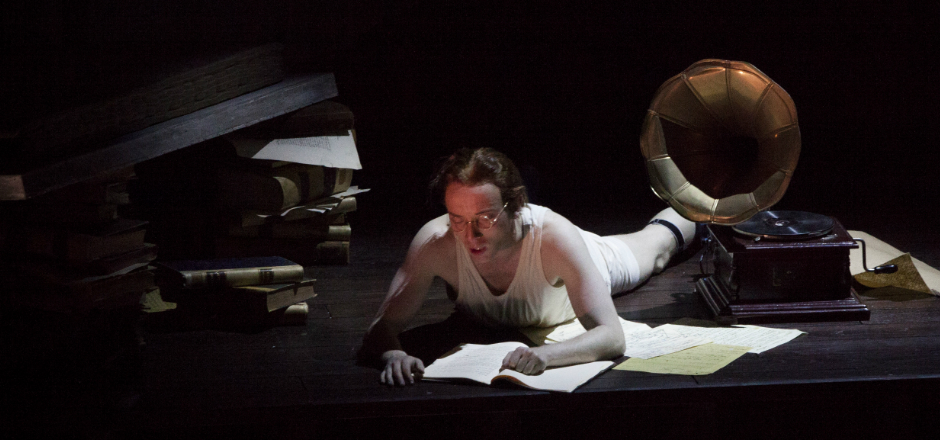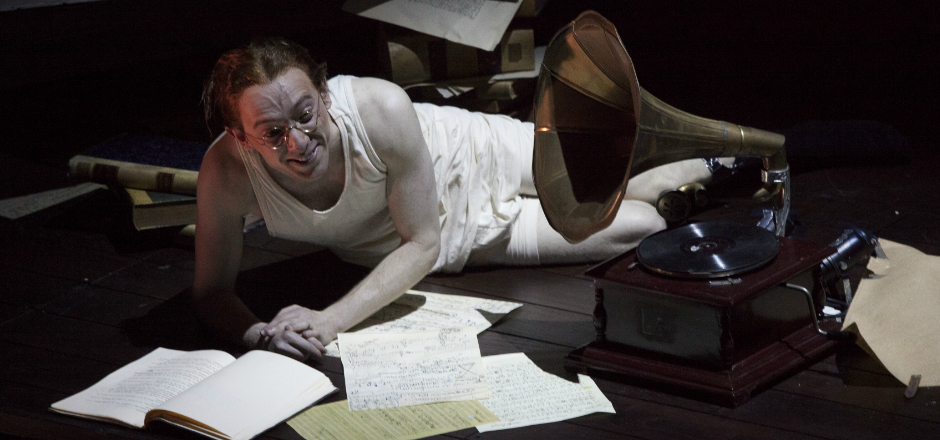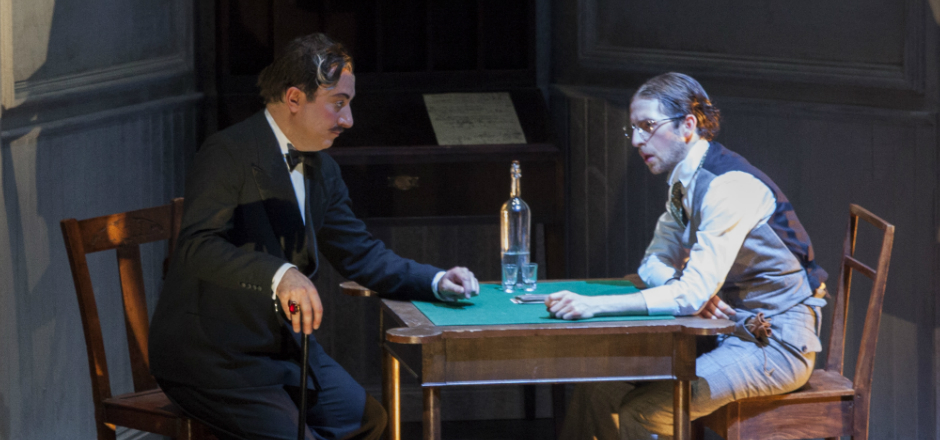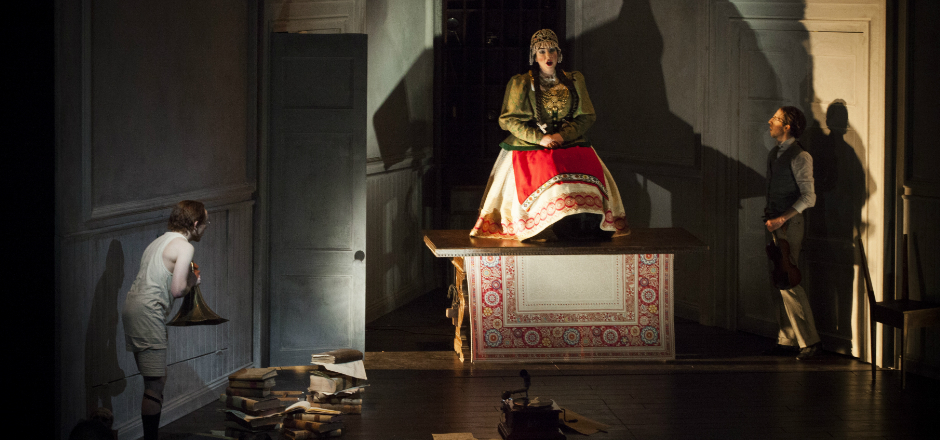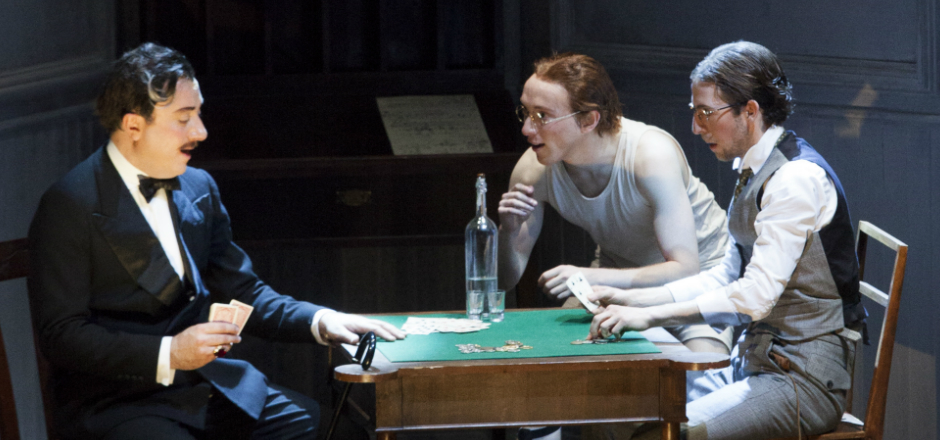80° Maggio Musicale Fiorentino
Opera
L'Histoire du soldat
Igor' Stravinskij
L'histoire du soldat
A story to be read, acted and danced, in two parts
Music by Igor Stravinsky
Libretto by Charles-Ferdinand Ramuz
First performance: 28 September 1918 at the Théâtre Municipal in Lausanne
A new creation inspired by the chamber opera of the same name by Igor Stravinsky
Editor Chester Music
General Agent for Italy Casa Ricordi, Milano
Artists
Conductor
Alpesh Chauhan
Director
Alessandro Talevi
Dramaturgy
Kara McKechnie
Scenes and costumes
Madeleine Boyd
Light designer
Marco Faustini
Videoprojections
Apparati Effimeri
Sound designer
Andrea Baggio
Choreographic movements
Anna Maria Bruzzese
Orchestra of the Maggio Musicale Fiorentino
Alpesh Chauhan
Director
Alessandro Talevi
Dramaturgy
Kara McKechnie
Scenes and costumes
Madeleine Boyd
Light designer
Marco Faustini
Videoprojections
Apparati Effimeri
Sound designer
Andrea Baggio
Choreographic movements
Anna Maria Bruzzese
Orchestra of the Maggio Musicale Fiorentino
Soldato
Martin Bassindale
Diavolo
Alex Blake
Narratore
Benjamin Victor
Principessa
Chiara Mogini
Martin Bassindale
Diavolo
Alex Blake
Narratore
Benjamin Victor
Principessa
Chiara Mogini
In 1918, Igor Stravinsky was living in the Swiss Alps with little hope of returning to his native Russia. The October Revolution of 1917 and the Brest-Litowsk Peace Agreement had cut him off from his properties, and had made him an exile. A long-running feud with his mentor, the charismatic impresario Sergei Diaghilev, meant that he was not earning royalties on the works which the Ballets Russes were still performing around Europe. He had four young children, a wife in poor health and various family members and friends to support. These were years of acute personal and financial difficulty.
Stravinsky’s association with a group of local Vaudois artists and his close friendship with writer F.C. Ramuz resulted in the collaboration of L’histoire du soldat in 1918. It was an enterprise born of necessity; Stravinsky was looking for ways to earn money and the pair devised a small-scale work which could tour easily around provincial Swiss towns. Stravinsky chose a Russian folk tale from Alexander Afanasyev’s seminal collection, which had also been the source material for the Firebird and Petrushka. Ramuz transcribed it into French rhyming verse, eliminating the original Russian context in favour of a universal setting with contemporary Swiss references. Ramuz also significantly altered the plot, and added a Calvinist moral didacticism which is quite at odds with Stravinsky’s sound-world and imagination up to that point in his career.
It is this conflict of vision and Stravinsky’s attempts to graft his very different musical style and imagination onto the work of his Swiss colleague, all set against the background of the First World War, which provides the catalyst for this production. Our reinterpretation projects the ‘universal soldier’ of Stravinsky and Ramuz’ invention back onto the years of the Great War, allowing us to examine history through the prism of a seminal work of art, whose centenary we celebrate in 2018.
Stravinsky merges with the character of the Narrator, and he sees himself in the Soldier as he reflects on his past mistakes and present difficulties – the Soldier is a deserter from enforced conscription; Stravinsky is an involuntary deserter from his homeland. Both long to return to their native land, prevented by the Devil’s tricks – in this production, he is presented as whomever and whatever the Narrator sees as the enemy: sometimes as War, sometimes as Death, robbing Stravinsky of family, friends and threatening the life of his wife, and sometimes as Lust, the sexual urge to seek other lovers. The Devil ‘shapeshifts’ into Sergei Diaghilev, manipulative, seductive, capricious, and even into Vladimir Lenin, whose Bolshevik party Stravinsky detested and regarded as the death of Russia.
The autobiographical angle allows reflection on exile, desertion, nostalgia and rootlessness, both in terms of Stravinsky’s life and of the plot of L’histoire. It emphasises the universal need of the artist to give expression to creativity in the face of insecurity, hardship and terrible human catastrophe.
Stravinsky’s multi-national, multi-lingual existence offers an important stimulus and has resulted in a production which communicates in the languages of the key countries in conflict during World War 1: England, France, Germany and Russia and Italy. Histoire du soldat, a work which combines the expressive elements of music, enactment, narration and dance, is augmented in its prose sections by a sound design which complements the various narrative strands and help transport us into the imaginary worlds and nostalgic memories of the composer. The atmosphere and earthiness of the original Russian folk tale is alluded to throughout the production and serves as a point of departure where the tension between Stravinsky's imagination and that of his poet is highlighted and provides dramatic impetus.
Alessandro Talevi/Kara McKechnie
